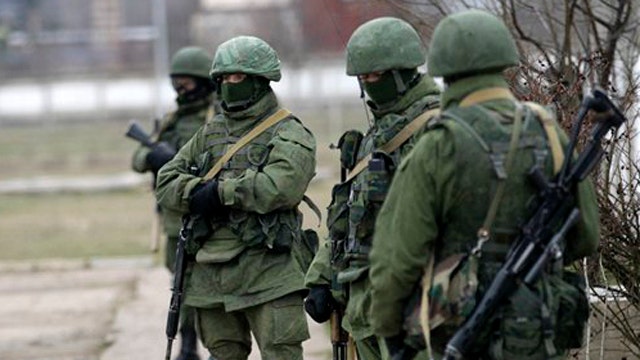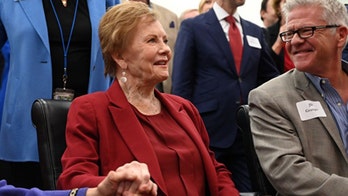World looks for solution as Russia tightens grip on Crimea
US weighs steps to 'isolate Russia' over Ukraine
KIEV, Ukraine – Dispatching sizable troop reinforcements into Crimea on Monday, Russia consolidated its military control over the southeastern Ukrainian territory and may be preparing for a wider invasion of the country, senior U.S. officials traveling with Secretary of State John Kerry to Kiev, the restive Ukrainian capital, said early Tuesday.
"We still have a very real concern that the Russians have other plans in the Ukraine," said one senior U.S. official, briefing reporters aboard Kerry's official airplane en route from New York to Kiev. "They may be planning other moves."
For the first time since the crisis erupted, senior U.S. officials complained of difficulty tracking Russian troop movements. They said the expected redeployment of Russian security forces following the end of the Olympic Games in Sochi, as well as routine military exercises in the area, had complicated the task of determining how many Russian troops are still pouring into Crimea.
The officials could not immediately dismiss reports that the number of total Russian troops in Crimea may now have reached as high as 16,000, which if true would appear to mark a surge of an additional 10,000 troops into the area within a period of 24 to 36 hours. "It's clearly a large number," an official said.
At the same time, the officials noted reports of Russian aircraft approaching, or even trespassing in, Ukrainian airspace, and Ukrainian jets scrambling to repel them. U.S. Ambassador to the U.N. Samantha Power told the U.N. Security Council on Monday that "it is a fact" that Russian jets entered Ukrainian airspace.
The U.S. officials also cited evidence that Ukrainian and Russian forces have each been massing on opposite sides of the isthmus that connects Ukraine to Crimea -- a development that one senior U.S. official said "raises the prospect" that the Kremlin may be preparing to "extend" its invasion to the mainland.
As Kerry landed in Kiev, Russian President Vladimir Putin delivered his first press conference since the start of the crisis, blaming what he called an "unconstitutional overthrow and seizure of power" by Ukraine's opposition.
The U.S. officials traveling with Kerry emphasized that the Obama administration is still seeking to "de-escalate" the Crimean crisis by giving Putin "off-ramps" he can pursue. However, the officials conceded that the Russian government has not listed any conditions, or any set of conditions, that can transpire or be arranged that would persuade Moscow to withdraw its forces from Crimea, as the U.S. and European allies are demanding.
If Putin does not withdraw Russian forces, the officials said, the U.S. will impose "more robust" punishments, including the imposition of sanctions on as-yet-unspecified Russian individuals and institutions. One senior U.S. official said such sanctions will likely be "coming soon ... in days, not weeks," but otherwise declined to elaborate on whom or what they would target or how they would be structured. Another official said the sanctions, in tandem with further measures coordinated with European allies, will have as their goal the establishment of "leverage over Russia."
The objective is to persuade Moscow to enter into a dialogue with the new Ukrainian government about the restoration of central control over Crimea and the holding of free and fair elections for the entire country on May 25.
One idea for punishing Moscow that Republican critics of the Obama administration have advanced in recent days these senior U.S. officials rejected flatly: a swift reappraisal of the administration's previous decisions on the siting of missile defense installations, long an irritant to the Kremlin.
Asked if the Ukrainian crisis has caused the administration to look at missile defense "with fresh eyes," one official said flatly: "No." The official added only that the subject is an "important" one for Washington to "keep talking to [the Russians] about."
Kerry touched down in Kiev early Tuesday, eager to demonstrate the United States' support for the interim Ukrainian government. Within a fortnight, the cash-strapped country has seen its Kremlin-allied president toppled from power amid bloody street protests in its capital and an invasion of its southeastern peninsula by Russian forces.
Kerry was to tour shrines in the public square in Kiev where scores of protesters were mowed down last month by snipers loyal to President Viktor Yanukovych, who has since fled the capital. After that, Kerry was meeting with the country's new interim prime minister and acting president, as well as leaders from its Rada parliament.
As Kerry arrived in the capital, the White House announced a $1 billion loan guarantee for the new government, aimed at helping it cement a separate financing deal with the International Monetary Fund. Specifically, the guarantee is intended to "insulate" the Ukrainian economy from the price shocks that are expected to occur when the government is forced, as a term of the IMF deal, to increase the cost of the energy supplies that Russia once subsidized.
The White House also announced that the U.S. will provide technical assistance to Ukraine, on matters ranging from the recovery of stolen assets and the diversification of the country's energy portfolio to how to hold nationwide elections on May 25.
Before setting out for Eastern Europe, Kerry had made a quick stop in Manhattan, where his daughter Alexandra resides, to welcome the birth of his second grandchild.





